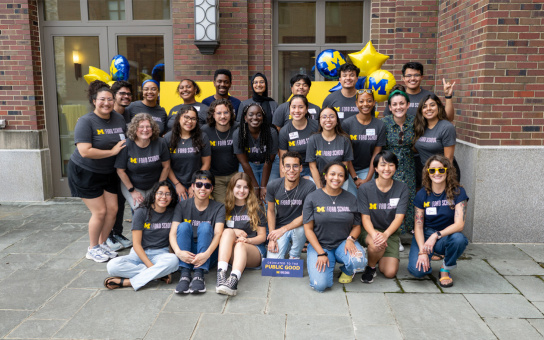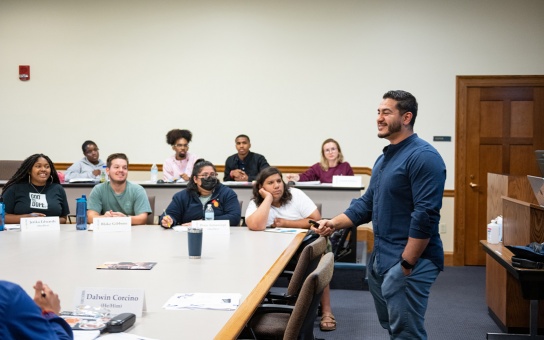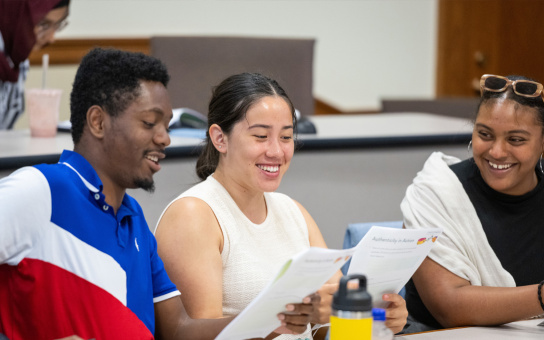
Promoting the inclusion and full participation of underrepresented groups in domestic and international public service for forty years.
Section Menu Diversity and leadership in public serviceFor over four decades, the Ford School has hosted a Public Policy and International Affairs (PPIA) Junior Summer Institute—an intensive seven-week summer program that focuses on preparing diverse undergraduate students from all over the United States for graduate programs in public policy and international affairs. Courses focus on leveling-up students’ communication and quantitative reasoning skills, which are vital to their success in graduate programs. These include statistics, microeconomics, and a writing course for the full seven weeks of the program, as well as shorter 2-3 week policy modules on a specific policy topic.

Courses focus on improving students’ communication and quantitative reasoning skills, which are vital to their success in graduate programs. There are no prerequisite courses, but previous experience in algebra is helpful. Students do not receive any course grades, but they will receive a detailed qualitative evaluation which can be used during the graduate school application process so that admissions committees can gain a deeper understanding of the student’s abilities.
Statistics: This course covers descriptive statistics, probability theory, probability distributions, sampling distributions, confidence intervals, and hypothesis testing. It also includes an introduction to experimental design. The emphasis in the course is on preparing students to be competent users and consumers of basic statistics.
Microeconomics: This course teaches the fundamental concepts in microeconomic theory that are essential as a foundation for the study of public policy, law, and international affairs. Students learn economic theory in order to model decision-making processes. They also learn how to evaluate whether an outcome is good for society and what incentives are needed to achieve a desired outcome. Each course lecture includes a policy debate that requires students to use economic models to analyze a policy problem and propose solutions.

Policy modules: In these courses, Ford School faculty introduce students to current policy issues, enabling them to apply analytic tools and to improve their communication skills—particularly writing composition. One policy module focuses on an international policy topic, and a second on a domestic topic. The material and approaches used in these modules draws from the statistics and economics curriculum. Students write policy memos analyzing each topical area, and gain expertise in oral presentation. Previous module topics have included diplomacy in Africa, counterterrorism, transportation policy, health policy, psychological approaches to decision-making, international economic policy, mass incarceration, public management and environmental protection, U.S-China relations, and many more.
Writing instruction: Students work with one of the Ford School's writing instructors for the duration of the program. The writing instructor conducts seminars on graduate school writing, with an emphasis on writing for a school of public policy and international affairs, and meets with students in individual writing conferences to give feedback, suggestions, and critique

Ford School JSI fellows will participate in meetings with guest speakers and attend professional development, career planning, and resume workshops—hosted by our expert career services staff—and sessions on preparing for the graduate school admissions process with our admissions team.
Previous years' programs have included visits to Chicago, Detroit, Flint, and Lansing to meet with government officials, community organizers, and policymakers. These opportunities allow students to learn about policy issues that are affecting citizens in real-time and allow students to envision themselves as future leaders in public policy. Fellows have also taken advantage of Ann Arbor's robust cultural and social atmosphere by participating in summer festivals like Top of the Park and the Ann Arbor Art Fair.

All applications to the Junior Summer Institute in Public Policy and International Affairs are submitted through the national PPIA office.
Please visit the PPIA website to review the eligibility requirements and application.
Learn more about the Junior Summer Institute from the JSI host schools below.